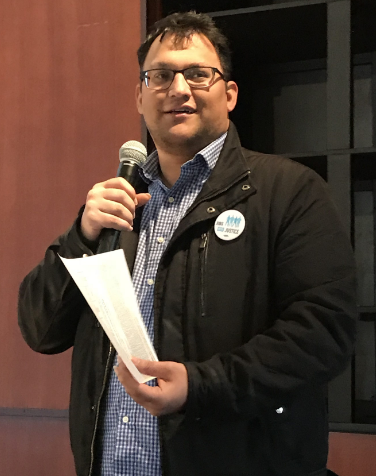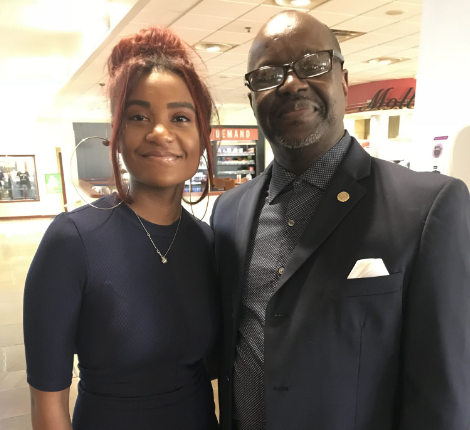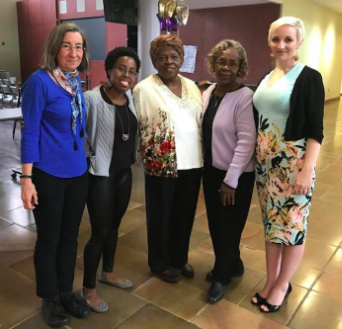Popular Education for Social Change:
An Ecomonic Teach-In At Agnes Scott College
This audio podcast is a concrete example of popular education for movement building and social change. As defined by the Highlander Research and Education Center: “Popular Education is a participatory process that combines people’s experiences to develop collective analysis and strategies for action for positive social change.”
This campaign has been “a long haul”, and we are continuing to “make the road while walking” (Myles Horton’s terms). The struggle for a true living wage is complex. For example, our dining hall staff are divided into Agnes Scott employees (Laborer’s International Union, with Facilities staff) and Aramark (four years unionized with SEIU). Aramark staff have four months a year with no work or pay as seasonal school employees in Georgia. For another example, our outsourced landscaping staff have zero sick days and greatly reduced vacation time with the new company. So there is a continued urgency to do this justice work. In addition to working on undoing structural oppression, the campaign has over the past 25 years founded an employee emergency fund and English for Speakers of Other Languages (ESOL) courses. Hourly staff and students are the core leaders of the movement, and any significant change is from their coalition work, along with support from community partners.

How do we educate at an institution that has as its mission statement: “AGNES SCOTT COLLEGE educates women to think deeply, live honorably and engage the intellectual and social challenges of their times”? We in the living wage campaign take this mission seriously and stand with our colleagues to work for a just campus. In the words of one custodian: “I choose to stand and make a difference.”
On Feb. 16, 2018 (Founders’ Day at Agnes Scott) the Agnes Scott College Living Wage Campaign held an Economic Justice Teach-In to raise awareness, educate, and movement build. The Living Wage Campaign has three major focus points: just wages, institutional respect, and democratic workplace. We are a coalition of hourly staff, students, a few salaried staff and faculty, and fabulous community partners (Atlanta Jobs with Justice, the Teamsters, WRFG (Radio Free Georgia) Labor Forum, Project South, Atlanta 9-to-5, Georgia Interfaith Power and Light, and Faculty Forward).
Alumna and former ASC living wage campaign organizer Jillian Wells (2010) served as emcee for the hour and a half event. Another alumna activist, Helen Cox (2010), joined us and offered historical perspective. Dr. Nathan Grigsby, music director for the Joyful Noise Gospel Choir at ASC, brought two soloists to add music to our event. Zion Martin sang “You Are Good Medley” by Todd Galberth, and Victoria Wallace sang, “Rise Up” by Audra Day. Neil Sardana of Atlanta Jobs with Justice spoke, as well as Anne Olson (Human Rights Atlanta), student activists Emma Fischer and Kristina Kimball, and hourly staff.
For the full video of the teach-in click here:
At the event we celebrated the work of past activists: Della Spurley-Bell and Carrie Wells, co-founders of the first and oldest unionized facilities staff in the U.S. South. Hear the story of the union founding here (retired custodians Della Spurley-Bell and Maggie Ivy):
The first Living Wage video was made in 2007 by ASC alumna Mia Mingus, who worked at the time at SPARK: Reproductive Justice Now:
A few days before the teach-in, Della Spurley-Bell and Tina Pippin appeared on the WRFG Labor Forum and were interviewed by Diane Mathiowetz and Paul McLannan. A summary of the history and issues of the campaign are here:
Videos from our alumnae, faculty, and community supporters are here:
resources
The Agnes Scott Living Wage Campaign can be found on social media:
Facebook alumnae group is Agnes Scott College: Living Honorably
Facebook page is ASC Living Wage
Twitter is @livingwageasc
Instagram is @asclivingwagecampaign
~~~~~~~~~~~~~~~~~~~~~~~~~~~~~~~~~~~~~~~~~~~~~~~~~~~~~~~~~~~~~~~~~~~~~~~~~~~~~~~~~~~
Barbara Ehrenreich, Nickle and Dimed: On (Not) Getting by in America. Picador, 2011.
Donald Hirsch and Laura Valadez-Martinez, The Living Wage. Agenda, 2017.
Stephanie Luce, Fighting for a Living Wage. ILR Press, 2004.
Annelise Orleck, “We Are All Fast Food Workers Now.” The Global Uprising Against Poverty Wages. Beacon, 2018.
Robert Pollin and Mark Brenner, A Measure of Fairness: The Economics of Living Wages and Minimum Wages in the U.S. Cornell University Press, 2008.
Robert Pollin and Stephanie Luce, The Living Wage: Building a Fair Economy. New Press, 2000.
David K. Shipler, The Working Poor: Invisible in America. Vintage, 2005.
Melissa Snarr, All You That Labor: Religion and Ethics in the Living Wage Movement. NYU Press, 2011.
Donald R. Stabile, The Living Wage: Lessons from the History of Economic Thought. Edward Elgar, 2009.
Interfaith Worker Justice: http://www.iwj.org/
Jobs with Justice: http://www.jwj.org/
United for a Fair Economy: http://www.faireconomy.org/
UFE’s Campus Living Wage Manual: http://www.campusactivism.org/server-new/uploads/campuslivingwagemanual.pdf
United Students Against Sweatshops: http://usas.org/
Family Budget Calculators:
Economic Policy Institute: https://www.epi.org/resources/budget/
MIT Living Wage Calculator: http://livingwage.mit.edu/
Fact Sheet for Living Wage at Agnes Scott College:
https://nothingneverhappens.org/wp-content/uploads/2018/03/LWFactsheet-Nov2017-2.docx


